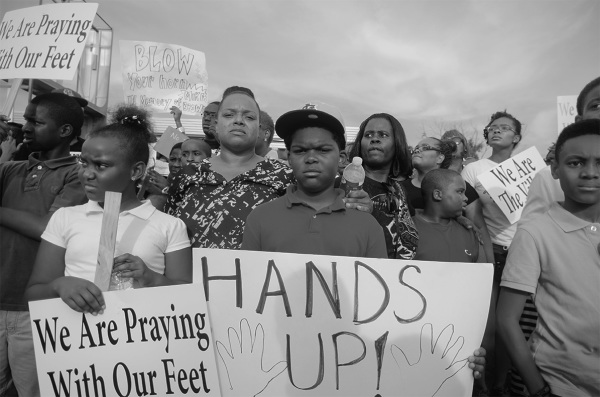Just before Thanksgiving break a Grand Jury in Ferguson, MO decided not to indict Officer Darren Wilson, who allegedly shot and killed Michael Brown. Debate and discussion surrounding the case, race, and oppression in America was reignited once again. The essence of the dialogue on modern U.S. race relations taking place is great. My opinion on the matter—leave the events of Ferguson out of the discussion.
With Ferguson being so recent, it makes for a great starting point for conversation over racism and flawed systems that exist in America. But when you actually get into the meat of Ferguson it turns out to be a real mess.
Trying to advance any position on any side of the conversation regarding racist systems in the United States based on the events in Ferguson isn’t going to go much of anywhere. This is because the events of that day aren’t clear, and simplifying what happened is not a convincing way of argumentation. Does racism exist in America? Yes. Is our law enforcement and judicial system flawed? Yeah, I’d say so. Is Ferguson a clear example of this? No. If we want to talk about the problems that need fixing let’s talk about them at a level they need to be discussed and not solely based on the events of one day in Ferguson.
What is clear and isn’t in dispute from witness testimony and physical evidence is this; Michael Brown and Darian Johnson went to get some Cigarillos, they were walking home in the middle the road, Officer Darren Wilson told them to get off the street, perhaps impolitely, it’s not clear, they said they’d get off the street soon. Wilson stopped them, and an altercation happened between Wilson and Brown which ultimately ended up with Brown being shot and killed.
It’s quite a mess. There are conflicting testimonies about how exactly Brown had his hands held at the time he was shot varying from them being at a torso level to up above his head. There are conflicting accounts of what happened at the car door, from Wilson trying to pull Brown into the car, to Brown trying to grab Wilson’s gun. The testimony from witnesses has done little to help clear this up, and physical evidence only tells us so much for certain.
We were able to hear Officer Wilson’s side of the story. Sadly, we were not able to hear from Brown, but could hear from Dorian Johnson, who was with Brown in the moments before his death.
The problem with this is that in one account we get a picture of a police officer trying to do his job, fearing for his life, and unfortunately killing another human being in self-defense in the line of duty. On the other hand we get a picture of an officer acting out aggressively toward a quiet 18-year old, and ultimately killing him in cold blood. So who are we supposed to believe? What can we say about what happened?
I’m not saying we can’t make our own opinions on what happened, or that we can’t debate and deliberate about the events of the day. I’m saying that to do so takes great time and effort, and ultimately doesn’t do much to advance discussion over oppressive systems in America.
The media has not helped anything either from the start, reporting all kinds of evidence and testimony before investigation had been done and fanning fires and debates over uncertain facts. People have been forming opinions based on media reports from the start, and changing opinions can be hard. These pre-formed opinions based on initial media reports also bias how we view the outcomes of the grand jury trial and the evidence that is now available for the public to review, which is a hefty read, but worth the time it takes.
Trying to debate what happened in Ferguson and the outcome of the Grand Jury trial does little to advance repairing race relations in the United States. This is a discussion on the reform of our judicial system in order to end systematic racism and oppression.
It’s not clear, Ferguson brought to light problems in our nation that need fixing, so why dedicate so much time and energy to debate over it when we have the information we need to make a case? We should base our conversations on facts such as the grossly disproportionate number of black males in the prison system. We should talk about how different policies disproportionately impact minorities and those in lesser socioeconomic circumstances.
Ferguson is a jumping off point, but it’s not an argument to win. The problems are larger than this one unclear incident, and I don’t say all this to belittle the death of Brown, but if we want reform and justice, we need to look at the bigger picture and the state of things in society as a whole.
-Matthew Glaser

A good and thoughtful post